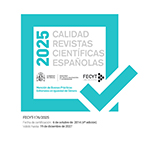Análisis de las actuaciones de familia y escuela durante la pandemia: una mirada desde la Educación Infantil
Resumen
La situación generada por el COVID-19 ha puesto de manifiesto que, en educación infantil, el modelo asistencial se ha quedado atrás frente al educativo. Con esta investigación se ha analizado, en la situación excepcional de confinamiento, tanto la manera de afrontar esta situación de cierre de las aulas desde los centros educativos como las respuestas proporcionadas por las familias, teniendo en cuenta la titularidad de los centros, el ciclo impartido (primer ciclo, segundo ciclo o ambos), el año de nacimiento de los menores o el número de hijos en los hogares. Para ello, se han elaborado ad hoc dos cuestionarios contestados durante los meses de abril y mayo por 1235 docentes de esta etapa de todas las Comunidades y Ciudades Autónomas de España y por 1266 familias de menores que cursan educación infantil. Los datos recogidos se han analizado mediante un examen exploratorio de las respuestas y el cálculo de los principales porcentajes asociados a las variables consideradas para, posteriormente, realizar un análisis inferencial de la información disponible, empleando la prueba H de Kruskal-Wallis para analizar los datos procedentes de las escalas Likert y la prueba Chi-cuadrado para el estudio de las variables categóricas. Los resultados muestran que existen diferencias estadísticamente significativas en el envío de tareas en función del ciclo y de la titularidad del centro, siendo los centros privados los que menos actividades han enviado. Asimismo, casi la mitad de las familias encuestadas señala que necesitan recibir más indicaciones, siendo aquellas cuyos hijos asisten a escuelas públicas las que más lo demandan. Es por esto por lo que se puede concluir que las máximas establecidas en la legislación vigente no se han cumplido en todos los casos.
Descargas
Descarga artículo
Licencia
La Revista Complutense de Educación, para fomentar el intercambio global del conocimiento, facilita el acceso sin restricciones a sus contenidos desde el momento de su publicación en la presente edición electrónica, y por eso es una revista de acceso abierto. Los originales publicados en esta revista son propiedad de la Universidad Complutense de Madrid y es obligatorio citar su procedencia en cualquier reproducción total o parcial. Todos los contenidos se distribuyen bajo una licencia de uso y distribución Creative Commons Reconocimiento 4.0 (CC BY 4.0). Esta circunstancia ha de hacerse constar expresamente de esta forma cuando sea necesario. Puede consultar la versión informativa y el texto legal de la licencia.











